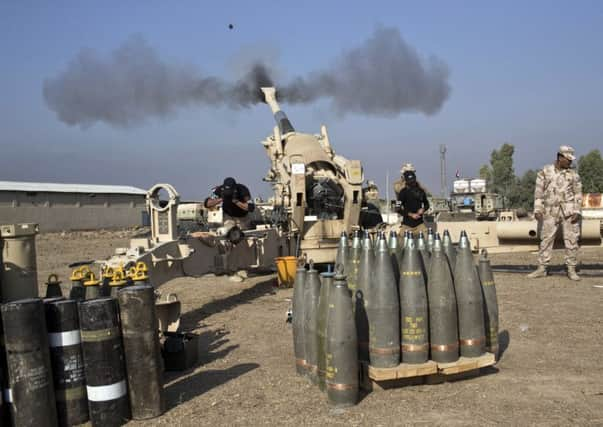Syrian Kurds push ahead in bid to retake Raqqa from militants


Members of a coalition of Kurdish and Arab fighters known as the Syria Democratic Forces (SDF) have been on the offensive in the area since late Saturday, aiming to initially isolate and encircle Raqqa.
The United States, France and Britain said they would provide air support for the offensive, which was announced at a news conference on Sunday in Ein Issa, north of Raqqa.
Advertisement
Hide AdAdvertisement
Hide AdBut the announcement lacked details on how the SDF, dominated by Kurds, plans to oust the militants from the city, home to nearly 200,000 mostly Sunni Arabs and an estimated 5,000 IS fighters.
The battle of Raqqa could be long and costly; IS fighters are expected to fight until the end since its loss could be an existential threat. It would mean the extremist group would have no full control of any large cities in Syria, just as Iraqi forces are pushing forward against IS-held Mosul, Iraq’s second largest city.
Earlier this year, it took SDF fighters more than two months to capture the Syrian town of Manbij, which is far smaller than Raqqa.
Raqqa has been under IS control since early 2014; it is home to some of the group’s top leaders and is seen as the key to defeating the group militarily. It has been the extremists’ de facto capital since they declared a caliphate in areas they control in Iraq and Syria in June 2014.
The US commander of coalition forces fighting the Islamic State group said the operation to take Raqqa aims at eventually cutting off the extremists from Mosul, where US-backed Iraqi forces have entered the city’s eastern outskirts amid fierce resistance.
Lt General Stephen Townsend said in a statement that the Arab element of the SDF is “indigenous to the area” and will help establish “regional support” for SDF operations. His comments appeared to be aimed at soothing concerns that Kurdish forces would take over Raqqa, a predominantly Sunni Arab city.
Unlike numerous successful military efforts to drive Islamic State militants out of cities in Iraq, the Raqqa offensive faces several political obstacles.
In Iraq, a US-led coalition is working with the government in Baghdad, but Washington and its partners in Syria are relying on a hodgepodge of local Arab and Kurdish opposition groups, some of which are fierce rivals. The tensions are exacerbated by Russian and Syrian forces on one side and Turkish-backed forces on another.
Advertisement
Hide AdAdvertisement
Hide AdTurkey’s President Recep Tayyip Erdogan reiterated the country’s opposition to the use of Syrian Kurdish fighters in the battle against the Islamic State group.
Turkey views the US-backed Syrian Kurdish militia, the People’s Protection Units, or YPG, and its political wing as terror organisations.
Erdogan did not make a direct reference to the ongoing operation to free Raqqa, but said “no one in the world will buy this naïve attitude (attacking) Daesh with another terror organisation.”
The fighting in northern Syria is taking place under the cover of airstrikes by the US-led coalition that played an instrumental role in the past in battles between SDF and the extremists.
The US Central Command said coalition aircraft conducted 16 airstrikes in northern Syria, mostly near the area of Ein Issa, north of Raqqa, where the fighting appeared to be concentrated.
It said that they engaged 12 IS tactical units and destroyed six fighting positions, five vehicles and two vehicles rigged with explosives. They said airstrikes were conducted on Sunday.